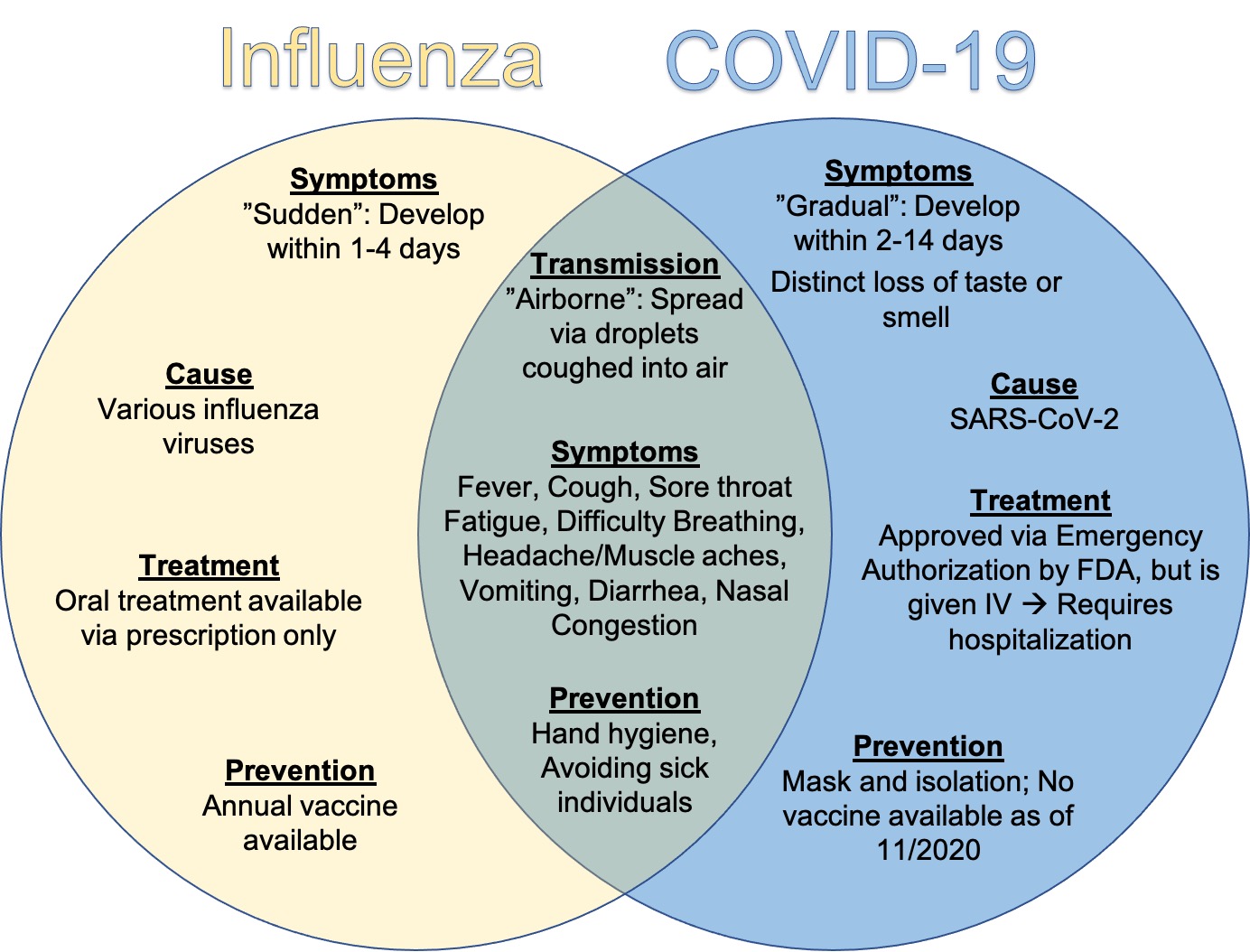Is It the Flu or COVID-19? Here Is Everything You Need to Know This Season. By Our Student Pharmacist, Cassadie Baker.
As the flu season ramps up this year, you might still have questions about how to protect yourself and your loved ones during the COVID-19 pandemic. Here are answers to some common questions about both illnesses.
What is the difference between the flu and COVID-19?
Both infections are caused by respiratory viruses, however, these viruses are different from each other. Influenza is caused by different strains of the Type A or Type B influenza virus, which mutate rapidly and vary from year to year. COVID-19 is caused by a new coronavirus called SARS-CoV-2, which began spreading in 2019. The diagram below summarizes a comparison between the viruses.
Is there a way to tell if I have either the flu or COVID-19 at home?
Unfortunately, there is no way to differentiate between the flu and COVID-19 based on symptoms alone. Both viruses cause mild to severe respiratory infections, and they cause many of the same symptoms including, but not limited to:
- Cough
- Fever (100°F or greater)
- Difficulty breathing
- Sore throat
- Fatigue
- Headaches or muscle aches
- Nasal congestion
- Diarrhea
- Vomiting
Sometimes a person experiences a loss of taste or smell after contracting COVID-19, however, not everyone who gets COVID-19 experiences this and in many cases will not show symptoms at all. To complicate matters, it is also possible to contract both COVID-19 and the flu at the same time!
So, what should I do if I feel sick?
While some feel pressured to continue going to work or other activities, the best thing that you can do is stay at home! Getting adequate rest helps your immune system combat the infection more effectively. Additionally, some people are at increased risk of severe complications from catching either of these viruses. Even if you’re not sure, isolate yourself to prevent the spread in case you are infected.
What are signs or symptoms that I should report to my doctor right away?
If you show any symptoms listed above, contact your primary care provider. They may refer you to a clinic for either flu or COVID-19 testing. It is especially important to notify your doctor if you are at least 65 years old, pregnant, or have chronic conditions such as asthma, COPD, or heart failure.
If you experience severe symptoms such as wheezing or a fever of at least 103°F, go to the nearest urgent care or ER. These may be signs of complications such as pneumonia, and they require treatment as soon as possible.
What should I do to protect myself and others?
There are quite a few things you can do! First, if you need to cough, do so into a tissue or your elbow. Both influenza and coronaviruses are airborne, which means that they primarily spread via droplets that are coughed, sneezed, or even talked into the air. Avoid close contact with anyone that you know is sick, if possible. Wear a mask that covers your nose and mouth, and keep a distance of about six feet between individuals to minimize the spread of COVID-19.
Viruses can survive on your hands or surfaces for extended periods of time. Wipe down dirty surfaces, and wash your hands regularly. If soap is not available, use hand sanitizer containing at least 60% of ethyl alcohol (ethanol), as demonstrated below.
Finally, get the flu shot if you haven’t already! The vaccine covers four of the most dangerous strains of influenza so that if you come into contact your symptoms are minimized, if not completely prevented. It takes two weeks for your immune system to build up, so get vaccinated sooner rather than later.
Where can I find more information about the flu and COVID-19?
CDC.gov regularly updates their website as soon as new information is available about either virus. You can also visit your county’s public health website for information regarding local outbreaks and COVID-19 testing locations.
References:



